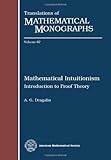Mathematical Intuitionism Introduction to Proof Theory
Material type: TextLanguage: English Series: Translations of mathematical monographsPublication details: Providence, R.I American Mathematical Society 1988Description: ix, 228pISBN: 0821845209Subject(s): Intuitionistic mathematics | Mathematics
TextLanguage: English Series: Translations of mathematical monographsPublication details: Providence, R.I American Mathematical Society 1988Description: ix, 228pISBN: 0821845209Subject(s): Intuitionistic mathematics | Mathematics BOOKS
BOOKS
| Current library | Home library | Call number | Materials specified | Status | Date due | Barcode |
|---|---|---|---|---|---|---|
| IMSc Library | IMSc Library | 510.6 DRA (Browse shelf (Opens below)) | Available | 36718 |
Translation of Mathematical intuitionism
Logic Arithmetic Algebraic models Analysis Eliminability of cuts in the intuitionistic simple theory of types in the form of a sequent calculus with extensionality Appendix A: An algebraic approach to models of realizability type Appendix B: A strong form of the normalization theorem.
In the area of mathematical logic, a great deal of attention is now being devoted to the study of nonclassical logics. This book intends to present the most important methods of proof theory in intuitionistic logic and to acquaint the reader with the principal axiomatic theories based on intuitionistic logic.


There are no comments on this title.